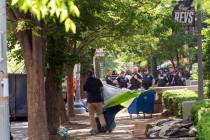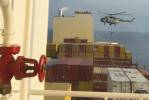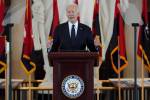Holocaust survivor inspires young lives with memories of loved ones
The book is made of paper torn from cement sacks. Its binding is a twist of common fencing wire.
By any measure it is a crudely constructed publication, and yet within its few simple pages you'll find the essence of 77-year-old Stephen "Pista" Nasser's reason for living.
A lifetime ago in a world that turned its eyes from the Holocaust, Nasser was a scared 13-year-old Hungarian boy who stood naked with his brother in a delousing line at Auschwitz. He already had seen family members murdered and was still stunned by the sudden disappearance of his mother.
Pista would be one of the lucky ones. He secreted a Boy Scout pen knife past a guard and was ordered to a group that was being shipped to a hard labor camp at a small Bavarian town, Muhldorf. The Nazis were attempting to construct an enormous underground complex that would be safe from Allied bombers.
With the pen knife, he carved small figurines that impressed a guard.
"Oh, you're a little artist," the guard said.
Pista exchanged the carvings for pencils he used not only to draw artwork, but to write a journal of the more than one year he spent in the labor camp.
He wrote in secret on scraps of paper torn from the cement sacks discarded on the job site. That journal would later become the heart of Nasser's book, "My Brother's Voice: How a Young Hungarian Boy Survived the Holocaust, A True Story."
Beginning in 2003, Nasser embarked on a mission to tell his story and remind everyone he meets about the nightmare of the Holocaust and the importance that they never forget its lessons. Among them: "If it happened to one section of humanity, it can happen to all."
So far, he has spoken at 410 locations before approximately 100,000 people, from his home in Las Vegas to Muhldorf itself. Last year, his journey took him to St. George, Utah, where he addressed high school students, including a group of juvenile offenders.
Not long afterward, Nasser received a package in the mail that contained a book made of cement paper, not too unlike the one he'd used in secret to record his daily life so many years before. Its pages were filled with effusive thank you letters from the young people whose lives he had touched.
In that moment he was reminded of his brother, Andris, and his parents and relatives. All gone but remembered more than six decades later in the minds and hearts of strangers. The voices of his brother and his parents echoed through the years.
"Dear Pista," one of many students wrote. "To me it's almost unbelievable how much you had to endure. I've always gone through life believing there is no hope. But I've recently changed my mind. You are my hope, hope that you may face what you fear most, but with effort you can make it through."
Wrote another, "I am searching deep inside me for meaning and truth and getting my life on track because I now see it's worth it and I shouldn't take the gift of life for granted."
In heavily accented English Nasser recalled, "When I write the diary, that was the basis of my survival. Because I had so much anger and so much hatred against the Nazis. ... I poured my heart into it and it gave me strength to write day to day. I wrote it inside the concentration camp under the nose of the Nazis at the age of 13 on cement paper."
Gradually, Nasser's humble but dramatic story is taking on a life of its own and is touching other lives. He believes it's what his parents and his brother would want.
"These students in Utah, to them it was a life-changing experience," Nasser said. "They challenged themselves, if I at age 13 was able to do what I did, they have nothing to complain about, and they would try to drop drugs and such. They created this miniature diary."
He held out the humble book from the students, talked about the painful process he went through to learn to differentiate between hating the Nazis and all Germans. Although he had every right and opportunity, he never let his anger consume him.
Then Stephen Nasser said, "With love you can achieve much more than with hatred."
John L. Smith's column appears Sunday, Tuesday, Wednesday and Friday. E-mail him at Smith@reviewjournal.com or call (702) 383-0295. He also blogs at lvrj.com/blogs/smith.




















